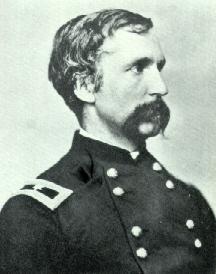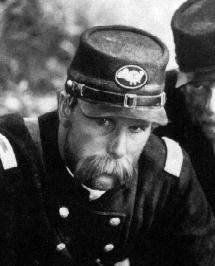

Rank, duty position and unit at time of action:
Colonel, Commanding Officer of the 20th Maine Infantry Regiment, V Corps, Army of the Potomac
War:
Civil War
Place and date of action:
Little Round Top, Gettysburg, Pennsylvania, 2 July 1863
Portrayed by:

In the film:
CHAMBERLAIN, JOSHUA L.
Rank and organization: Colonel, 20th Maine Infantry. Place and date: At Gettysburg, Pa., 2 July 1863. Entered service at: Brunswick, Maine. Born: 8 September 1828, Brewer Maine. Date of issue: 11 August 1893. Citation: Daring heroism and great tenacity in holding his position on the Little Round Top against repeated assaults, and carrying the advance position on the Great Round Top.
Assigned to hold the extreme left flank of the Army of the Potomac at Gettysburg with an understrength regiment of 386 men, Chamberlain successfully repulsed six assaults by a Confederate brigade through a series of unconventional, creative maneuvers. When the 20th Maine ran low on ammunition, Chamberlain desperately led, with more unconventional maneuvering, a preemptive bayonet counterattack, capturing over 400 prisoners and driving the remainder of the Confederate brigade into headlong retreat. (The 20th Maine's regimental color sergeant, Sergeant Andrew J. Tozier, played by Herb Mitchell in the film, also earned the Medal of Honor in the same action, and at least three other Medal of Honor recipients who earned their awards at Gettysburg during the defense of Cemetery Ridge on the next day were depicted in cameo appearances.)
A professor of rhetoric at Bowdoin College before the war, Chamberlain continued to distinguish himself in battle after Gettysburg. Slightly wounded at Little Round Top, he was wounded five more times, on two of these occasions severely enough that his obituary was prematurely published, with General U.S. Grant promoting him to Brigadier General at Petersburg, Virginia in June 1864 on what was presumed to be his death bed. Only the pleas of his younger brother Thomas (also an officer in the 20th Maine and portrayed in the film by C. Thomas Howell) kept the surgeons persisting in repairing his shattered pelvis and bladder, rather than letting him die without further suffering on that occasion. He not only survived that wound but returned to battle, finishing the war with a brevet promotion to Major General, and being selected by General Grant to preside over the formal Confederate surrender of arms and colors at Appomattox. He was elected Governor of Maine shortly after the war, then returned to Bowdoin College as its president, and also served as Adjutant General of the Maine National Guard.
It was in the latter capacity in the 1880s that Chamberlain contributed perhaps more than anyone other than President Theodore Roosevelt to the deflation of the Medal of Honor and making it the ultimate US military award. Prior to his receiving the Medal himself (in 1893, 30 years after the action), he initiated the revocation of the award of the Medal of Honor to several hundred members of another Maine regiment. These awards had been given merely for the soldiers extending their enlistments while in garrison in Washington during the Gettysburg Campaign, at the same time Chamberlain's own men were being slaughtered on Little Round Top.
The film Gettysburg succeeds admirably in depicting and honoring Chamberlain. While managing to sufficiently encompass the largest battle ever fought in the Western Hemisphere, the film maintains a sharp enough focus on Chamberlain to give a comprehensive account of his experiences throughout the battle. This is due largely to Michael Shaara, whose historical novel The Killer Angels the Gettysburg script faithfully follows, and who chose Chamberlain to personify the whole Union cause while maintaining remarkable historical accuracy. Few battle scenes in other movies, either fact or fiction based, match the intensity of the defense of Little Round Top by the 20th Maine. It is a rare performance for Jeff Daniels, whose career appears solidly entrenched in physical comedy. It is a shame that the film Gettysburg is now relegated to videotape and DVD, rarely to be seen on the big screen anymore, that its commercial theatrical run was limited to selected theaters for a few weeks in the Fall of 1993, and that too many film critics with attention deficit disorder whined and kvetched about its 4 1/2 hour length. No other historical event was better recreated on film, and few films have left the viewer with the same sense of exhaustion and having actually experienced the event.